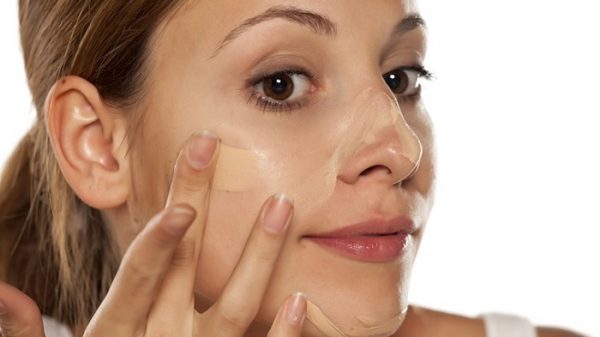Do you know everything about the foundation you use?

ShawdeshDesk: All of us are always looking for that one foundation that will perfectly blend with our skin tone — not too light, not too dark. But we also admit that zeroing in on that one shade is not that easy. You have to carefully look into the type, the kind of coverage and how it reacts with your skin (does the colour oxidise or not). But fret not, as we list down all that you need to keep in mind before you walk into the cosmetic store.
Types of foundations
Before you begin searching for the perfect shade, you need to focus on the consistency you would like to apply on your skin. By this we mean whether you want a powder foundation or a liquid one. Or whether sticks work for you. Also, note that they differ when it comes to their application, and each type has its own pros and cons.
Liquid foundation
This type is the most common. Considered to be the best for dry skin, liquid foundations come in a bottle which has a pump attached to it (there are also some with spatula). Before applying, shake the bottle, pump a few drops depending upon the coverage you need, and then use your foundation brush or your beauty blender to buff it into your face.
Powder foundation
This type of foundation provides sheer coverage, and comes in a pressed powder form. All you need is a puff which comes with the product to apply it on your face. A tip: Never swipe the product on your skin, always dab it. The foundation is pretty lightweight as compared to its liquid counterpart and gives a natural finish.
Tinted moisturiser
These provide the lightest coverage, and usually come in the form of BB or CC creams. They also have SPF in them. Unfortunately, tinted moisturisers are not meant for covering blemishes or acne marks.
Stick
Stick foundations are easier to work with mainly because of their compact packaging. They are best for those in-between touch-ups when your schedule is jam-packed. Also, out of all the types, this is a double-duty product because it also acts as concealer for under eyes and blemishes because of its thicker consistency. Dab some on that zit and you will be good to go.
Mineral
Mineral foundations provide light coverage, but can be built upon. This foundation works best for those with acne-prone skin because it doesn’t have a lot of chemicals. Use a flat kabuki brush in circular motions across your face to apply the product. Also, do not forget your neck.
Now that you have chosen the consistency, it is time for you to go for the kind of coverage you want. Given below are the types of coverages provided by various kinds of foundations.
Coverage provided by foundations
Light
If you are someone who is a big fan of the no-makeup makeup look, go for a light coverage foundation. Consisting of a mere 18 per cent pigment, the product doesn’t hide skin marks or blemishes, it rather evens out the skin tone. It is breathable and works best for those who have a near-perfect skin (which is a dream!).
Medium
Foundations with medium coverage can most likely be built up to a full or high coverage look. Providing up to 23 per cent of pigment, it can easily help one cover up blemishes, redness, acne spots and freckles. Liquid foundations are well-known for providing this kind of coverage.
High
Well, you could almost say high-coverage foundation paint your face to perfection. Hiding everything from blemishes to dark circles to acne marks. Full coverage foundations consist of at least 50 per cent of pigment giving you a flawless appearance. Most of the times you do not even have to use a concealer unless it is for brightening the under eyes.
Now that you have gotten your hands on the foundation which sits perfectly with your skin type and your needs. Here are a few tips to keep in mind while applying a foundation:
Always remember less is more. You can build a foundation but not deplete it. Thus, begin with a thin layer on your face.
Moisturise, this is imperative. For the foundation to sit on your face, moisturise so that it not only stays put, your skin doesn’t look flaky and dry too.
While using a liquid foundation, apply it with a damp beauty sponge for a natural finish. It also ensures that streaks of foundation aren’t visible on your face.
Post applying foundation, ensure you set your makeup with a makeup setting spray. This ways your makeup will not budge and all the extra product on your face which gives a cakey finish will not be present.
Source: The Indian Express





























Leave a Reply